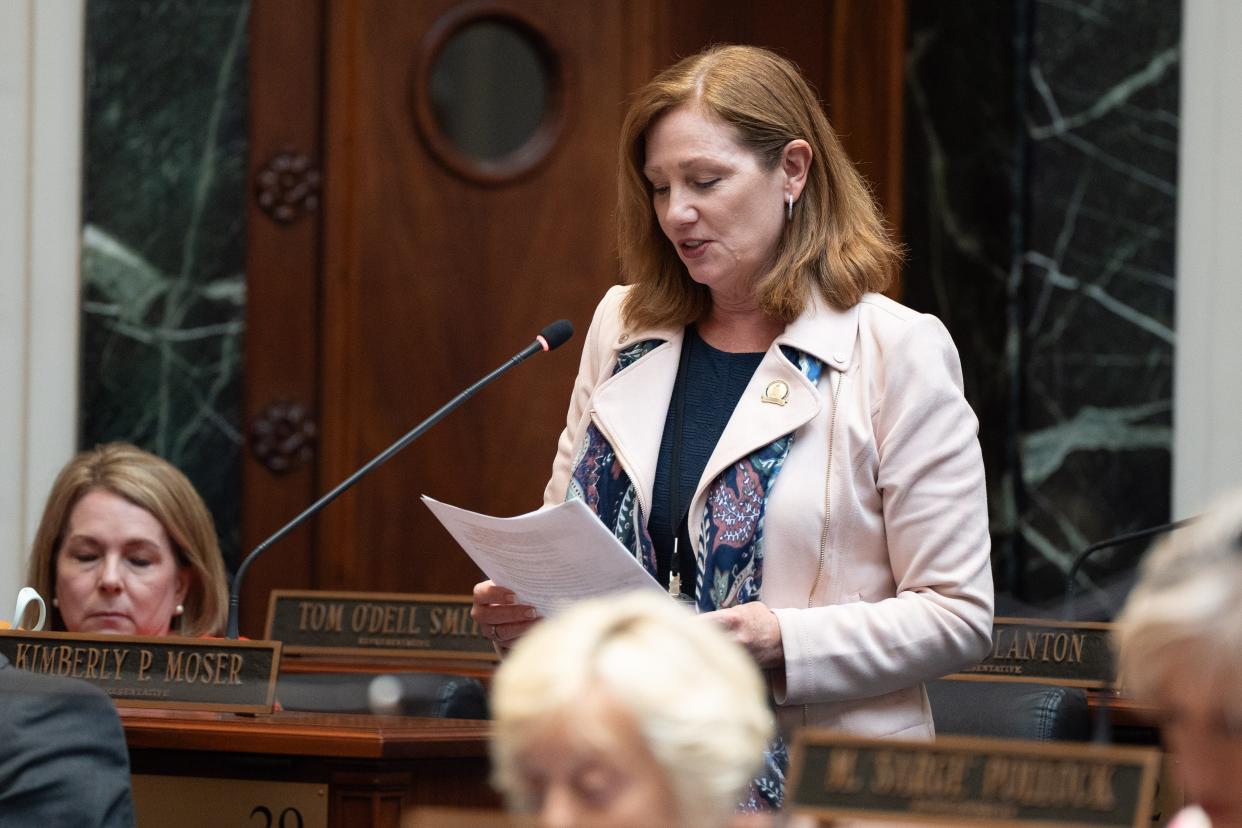The Kentucky 2024 legislative session is over. Here's what you missed on its final night
FRANKFORT— The final day of the Kentucky legislative session was marked by what didn't happen rather than what did.
On the Republican side, several bills reflecting key party priorities failed to get final passage, allaying the fears of diversity and open government advocates.
On the Democratic side, a last-minute procedural maneuver that would have opened the door to adding exceptions to the state's near-total abortion ban also failed.
And both sides turned to legislative procedure to save the day for a bill aimed at improving health care for pregnant women in Kentucky.
'Momnibus' passes at last minute
An omnibus maternal health bill with bipartisan support almost foundered on the shoals of abortion politics but managed to get final passage on Monday night.
House Bill 10, dubbed the "Momnibus," started its legislative career with all signs pointing toward passage: A bipartisan group of female legislators put aside their differences on abortion and crafted a bill aimed at improving maternal and child health in Kentucky.
That bill sailed through the House with unanimous approval but stalled when a Senate committee passed a version that would have required certain health care facilities to provide "perinatal palliative care" that included services for women who gave birth to nonviable fetuses or babies who die shortly after birth. The proposal included language that defined a "baby" as an "unborn child."
Democrats said the measure, initially proposed by Rep. Nancy Tate, R-Brandenburg, reinforced the state's anti-abortion stance and doubled down on Kentucky women with difficult pregnancies who may have preferred an abortion.

The addition of Tate's controversial proposal to the original Momnibus appeared to halt its progress. But at the last minute, legislative procedure saved it: The original bill was added as an amendment to a separate maternal health care bill, and it gained final passage with just hours left on the legislative clock.
Among other things, the Momnibus will change state law so that newly pregnant women can qualify for health insurance in Kentucky and establish a “Lifeline for Moms” to help health care providers find services for mothers with mental illness or intellectual disability.
Abortion-ban exceptions fails
Near the start of the session, Sen. David Yates, D-Louisville, proposed a bill to add exceptions to the state's abortion ban in the case of incest, rape, a nonviable fetus or to protect the health of a mother to Kentucky's near-total abortion ban.
Despite a Senate rule requiring all bills to be assigned to committee for consideration, Yates' bill never got a committee assignment. At the end of the session, he made an unusual procedural move, filing a "discharge petition" to dislodge the bill in hopes of a possible Senate vote on the matter.
"Kentuckians deserve to know where their elected leaders stand on this issue," Yates told reporters about his reason for filing the petition.

But the petition failed on Monday night, with Senate leadership saying the motion was order during a heated, if somewhat arcane, procedural deliberation on the Senate floor.
Floor Majority Leader Damon Thayer, R-Georgetown, said Yates' move was a political stunt on the last day of the legislative session because he could have raised the issue earlier.
Yates has vowed to introduce the bill again next year.
Anti-DEI and open records bills falter
It looked like lawmakers were going to resurrect Kentucky’s “anti-DEI” bill, but despite being posted on the Senate agenda, the chamber did not consider it on the last day of the session.
Despite Republican agreement that diversity, equity and inclusion initiatives are a problem, the party lacked consensus about a solution, resulting in dueling House and Senate versions of bills that took aim at DEI.
The Senate bill would have prohibited state universities from requiring students or employees to endorse a specific ideology or viewpoint to receive admission, employment, promotions or graduation. The House version went much further, requiring Kentucky's public colleges to dismantle on all diversity, equity, and inclusion programs and banning race-based scholarships at Kentucky’s public colleges.
Last month, the House gutted the Senate version and replaced it with its own, much-tougher version.
GOP Senators felt it best to work on the bill during the interim rather than vote for a House version not all caucus members agreed with, Senate President Robert Stivers, R-Manchester, told reporters Monday night.
“I think that was something that the caucus had a long debate and discussion about, and it wasn't a matter of not doing something versus doing something … but what should something be,” Stivers told reporters last week.
Government transparency advocates were also deeply concerned about a bill sponsored by Rep. John Hodgson, R-Fisherville, that would have created a loophole for public officials' text messages about official business if sent on privately owned devices. That bill failed to get a vote in the Senate on Monday night, and Stivers said it would be considered during the interim.
Lawmakers override Beshear vetoes, including Safer Kentucky Act, JCPS 'split' study, more
Hodgson said the bill was motivated by the desire to protect the private lives of officials, while critics said it opened the door for officials to conduct public business outside the purview of the state's open records law, which allows members of the public to view documents that shed light on the workings of government.
Gov. Andy Behsear had expressed support for the bill, which also required government bodies to create official emails for official business. Ultimately, though, the governor will not be forced to make a decision because the measure did not advance to the Senate floor.
Reach Rebecca Grapevine at rgrapevine@courier-journal.comor follow her on X, formerly known as Twitter, at @RebGrapevine. Reach reporter Hannah Pinski at @hpinski@courier-journal.com or follow her on X, formerly known as Twitter, at @hannahpinski.
This article originally appeared on Louisville Courier Journal: Kentucky legislature passes maternal health bill on session last night
